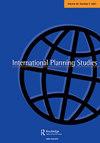密度奖励工具对城市规划的影响:放宽德黑兰的容积率规定
IF 1.5
Q4 REGIONAL & URBAN PLANNING
引用次数: 6
摘要
摘要本文利用德黑兰的经验证据,超越西方,探讨创业型地方政府对私人资本的依赖对城市规划系统的影响。本文的主要前提是,德黑兰市政府对开发商支付的建筑密度增加(密度奖励工具)产生的收入的财政依赖导致了对房地产市场利益而非城市战略需求或公共利益的规划。本文通过提供一个以德黑兰为中心的密度奖励工具的新案例研究,对城市规划文献做出了贡献;这可以更好地理解市政金融工具(如密度奖金)如何影响规划决策的问题。本文章由计算机程序翻译,如有差异,请以英文原文为准。
Implications of density bonus tool for urban planning: relaxing floor area ratio (FAR) regulations in Tehran
ABSTRACT This article, by using empirical evidence from Tehran, looks beyond the West to explore the implications of the reliance of the entrepreneurial local government on private capital for the urban planning system. The main premise of this paper is that the financial dependence of Tehran Municipality on income generated from increasing construction density (density bonus tool) paid by developers has led to planning that is responsive to property market interests rather than the city’s strategic needs or the public interest. This paper makes a contribution to the literature of urban planning by providing a new case study of density bonus tool focused in Tehran; that allows a better understanding of the issue of how municipal financial tools (such as density bonus) could affect planning decisions.
求助全文
通过发布文献求助,成功后即可免费获取论文全文。
去求助
来源期刊

International Planning Studies
REGIONAL & URBAN PLANNING-
CiteScore
4.60
自引率
4.80%
发文量
20
期刊介绍:
Planning, at urban, regional, national and international levels, faces new challenges, notably those related to the growth of globalisation as both an objective socio-economic process and a shift in policy-maker perceptions and modes of analysis. International Planning Studies (IPS) addresses these issues by publishing quality research in a variety of specific fields and from a range of theoretical and normative perspectives, which helps improve understanding of the actual and potential role of planning and planners in this context.
 求助内容:
求助内容: 应助结果提醒方式:
应助结果提醒方式:


